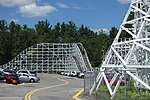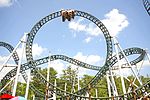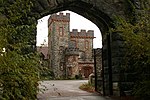Canobie Lake Park
Canobie Lake Park is an amusement park in Salem, New Hampshire, located about 31 miles (50 km) north of Boston. It was founded as a trolley park on the shore of Canobie Lake in 1902. Three local families currently run the park, which draws visitors from throughout the New England and Mid-Atlantic regions. Canobie Lake Park's age and history inspired author Stephen King to use rides and elements from the park in his Joyland novel. It is one of only thirteen trolley parks still operating in the United States as of 2021. The park originally featured botanical gardens, with few amusement rides. After the automobile became the most popular mode of travel in the United States, the trolley line serving the park was closed. Attendance in the park declined until it was purchased by Patrick J. Holland. He installed a wooden roller coaster named Yankee Cannonball in 1936, a ride which was designated as an ACE Roller Coaster Landmark by American Coaster Enthusiasts in 2013. The park recovered, and the Arrow Development designed Canobie Corkscrew was installed in 1987, after being relocated from the Old Chicago amusement park in Illinois, where it was named the Chicago Loop. Untamed, a Euro-Fighter coaster, is the only coaster with an inversion.
Excerpt from the Wikipedia article Canobie Lake Park (License: CC BY-SA 3.0, Authors).Canobie Lake Park
North Policy Street,
Geographical coordinates (GPS) Address Phone number Website External links Nearby Places Show on map
Geographical coordinates (GPS)
| Latitude | Longitude |
|---|---|
| N 42.795 ° | E -71.250277777778 ° |
Address
Canobie Lake Park
North Policy Street 85
03079
New Hampshire, United States
Open on Google Maps









